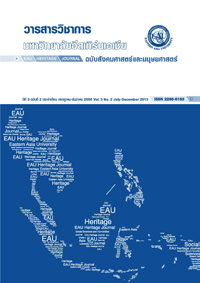รูปแบบการบูรณาการองค์ความรู้และภูมิปัญญาด้านสุขภาพของชุมชนแห่งการเรียนรู้: กรณีศึกษาชุมชนสวนป่านาบุญ
Keywords:
การบูรณาการ, องค์ความรู้, ภูมิปัญญา, การพึ่งตนเองด้านสุขภาพ, ชุมชนแห่งการเรียนรู้, integration, knowledge, wisdom, health self-reliant, learning communityAbstract
การวิจัยนี้ มีวัตถุประสงค์เพื่อศึกษาและเสนอรูปแบบการบูรณาการองค์ความรู้และภูมิปัญญาด้านสุขภาพ ของชุมชนแห่งการเรียนรู้สวนป่านาบุญ ใช้วิธีวิจัยเชิงคุณภาพ รวบรวมข้อมูลโดยการสังเกต การจดบันทึกภาคสนาม และสัมภาษณ์เชิงลึกกลุ่มตัวอย่าง 15 คน ประกอบ ด้วยผู้นำชุมชน สมาชิกผู้ปฏิบัติงานด้านสุขภาพและผู้ป่วยที่มา เข้าค่ายสุขภาพ วิเคราะห์เนื้อหา สังเคราะห์องค์ประกอบและปัจจัยที่เกี่ยวข้องกับการพัฒนากระบวนการเรียนรู้ ปัญหาอุปสรรคของระบบการดูแลสุขภาพ และเสนอรูปแบบของการบูรณาการองค์ความรู้และภูมิปัญญาด้าน สุขภาพของชุมชน ผลการศึกษา พบว่าชุมชนมีผู้นำสร้างชุมชนแห่งการเรียนรู้และระบบการดูแลสุขภาพแบบ พึ่งตนเอง มีองค์ความรู้หลักยา 9 เม็ด ที่บูรณาการศาสตร์สุขภาพเข้ากับพุทธธรรม ซึ่งช่วยลดปัญหาความเจ็บป่วย ลงได้อย่างเด่นชัด ชุมชนมีการถ่ายทอดองค์ความรู้ด้วยกระบวนการอบรมที่เน้นการลงมือปฏิบัติจริง และมีเป้าเหมาย ที่สำคัญ คือ การปรับเปลี่ยนกระบวนทัศน์สู่การลดละกิเลส เสียสละเกื้อกูลสังคมในรูปจิตอาสา เกิดเครือข่ายแพทย์ วิถีธรรมขึ้นทั่วประเทศ การศึกษาครั้งนี้ค้นพบว่า ปัจจัยที่มีความเกี่ยวข้องกับการบูรณาการองค์ความรู้และภูมิปัญญา ในการดูแลสุขภาพ คือ (1) การพัฒนาคนด้านจิตวิญญาณ (2) ปรับเปลี่ยนกระบวนทัศน์ (3) ผู้นำที่มีคุณธรรม (4) การมีส่วนร่วมของสมาชิกที่มีคุณธรรมจะเกิดพลังการพัฒนา (5) การพัฒนาเครือข่ายการเรียนรู้
A Model of Integration of Health Knowledge and Wisdom in Learning Community: A Case study of Suanpa Naboon
This study aims to investigate the integration of health knowledge and wisdom in self-reliant community, Suanpa Nabun. The qualitative approach was applied. Data was collected by observations, field notes and in-depth interviews of 15 people including community leaders, members involved both as health care providers and as patients. Content analysis and synthesis of elements and factors of learning process development, including problems of health care systems was use. It also presents the model of integration of community health knowledge and wisdom. The findings demonstrate the village leaders create a learning community and self-reliant health care system. Here, it was shown that nine principles of health care integrated with Buddhist morality could clearly relieve illness. Knowledge transmitted by the training process in the community focused on practice. The aim of training was to change paradigms to resist temptation and to service learning for social responsibility. That led to a Buddhist medical network nationwide. The study also revealed that factors corresponding with the integration of knowledge and its efficient transfer were (1) spiritual development of people, (2) changes in paradigms, (3) existence of moral leaders, (4) participation of moral villagers leading to the development of power. (5) Learning network development.





